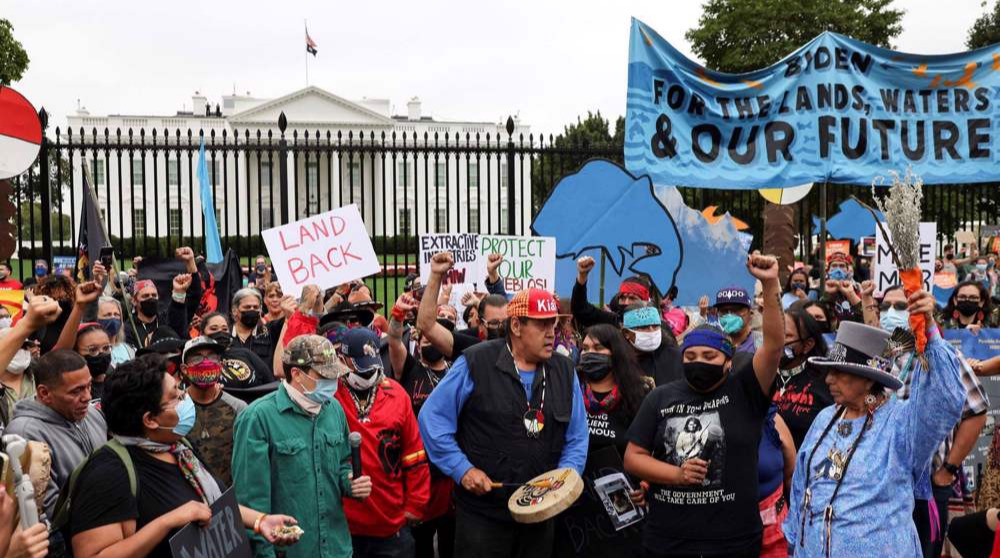
Demonstrators gathered at the White House in Washington, DC, on Monday, October 11, 2021. They urged US President Joe Biden to take stronger action on climate change. (Reuters photo)
Washington, October 11 (RHC)-- Climate protesters gathered at the White House on Monday in Washington, DC where they warned U.S. President Joe Biden to take their demands seriously, and declare a national emergency, and end projects involving fossil fuels.
The Build Back Fossil Free coalition took to the streets of the U.S. capital -- part of their five-day-long effort aimed to spur action by the Biden administration against climate change.
Siqiñiq Maupin, who is the director of coalition core member the Sovereign Inupiat for the Living Arctic, told reporters that they arranged the demonstration because they believe Biden needs to fulfill his campaign promises. "People are dying right now from the pollutants, the toxins, the climate catastrophes that are happening — and we have to stop the harm," Maupin wrote. "Biden’s election was riding on climate change; his entire election hinged on turning out people of color and Indigenous people."
"But when it really comes to what matters, our lives are still being sacrificed for oil and gas," Maupin continued. "That’s why we’re here today."
The Indigenous Environmental Network (IEN), which is a broad alliance of tribes, Indigenous rights groups, labor organizations, and others said in a statement on Monday that Biden “has consistently fallen short of protecting the water that sustains all life on Mother Earth and continuously failed to honor our treaties.”
The alliance noted that Biden has so far not moved to block Enbridge’s Line 3 replacement project in Minnesota, where Native Americans have led several demonstrations. “If President Biden was committed to honoring the treaties and strengthening sovereignty, he would implement a policy of Free, Prior, and Informed Consent by executive authority and act swiftly to mitigate the climate chaos that has engulfed our communities by ending the anti-Indigenous US legacy of fossil fuel extractivism,” the statement added.
“We have had enough of your empty words. Our communities need clean water, land returned, divestment from the fossil fuel industry, and healing from residential school traumas,” the alliance said.
Biden has pledged to transition the U.S. economy towards clean energy and reduce emissions from coal, natural gas and oil. Biden brought the U.S. back into the Paris climate accord in January after former U.S. President Donald Trump pulled the country out. And Biden has asked Congress to approve a $36 billion budget for fighting global warming in 2022.
The lion share of the budget will be allocated to clean energy initiatives, innovations and research, while a lesser share will go to the building infrastructures for storage and transmission of clean energy, as well as retrofitting homes and federal buildings.
Former U.S. President Donald Trump had labeled climate change a hoax, defying widening international support for the Paris agreement to cut greenhouse gas emissions. He argued that the concept of global warming had been “created by and for the Chinese in order to make U.S. manufacturing non-competitive.”
In June 2017, Trump announced that he was pulling out of the 2015 global agreement to fight climate change, characterizing the decision as "a reassertion of American sovereignty." The move drew a rebuke from Democrats at home and world leaders who had pressed Trump not to abandon the 197-nation accord. He argued that remaining in the deal would hurt the US economy.
A report by U.S. national security and intelligence experts warned that climate change could become a “catastrophic” security threat on both national and global levels. Global warming “will pose catastrophic, and likely irreversible, global security risks over the course of the 21st century,” experts wrote in a report released by the National Security, Military and Intelligence Panel of the Center of Climate and Security as quoted by The Hill in February 2020.
The report warned that all regions across the globe faced “serious implications,” adding that global warming could bring “catastrophic security impacts across the globe.”

